Dustdevil Diversity Spotlight: Nayeli López
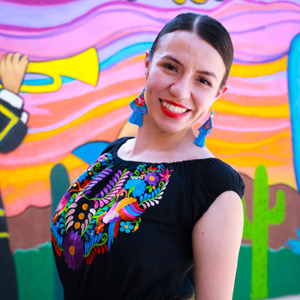
This is part of a series of interviews highlighting diversity at TAMIU. On the occasion of Hispanic Heritage Month, this interview features Nayeli López, Assistant Director, TAMIU Office of Student Orientation, Leadership and Engagement.
Tell us about yourself, where are you from and what you do here at TAMIU?
I was born in Los Angeles, Calif., and I grew up in the border towns of El Paso and Laredo. I come from a low-income, Mexican household where my culture was rooted in my daily life. From the Spanish language spoken at home, to the Mexican food that my abuelita cooked, to the telenovelas that my mother watched, and to all the times that my dad would scream at the TV with a “GOOOAAALL” when the México soccer team would play… my Mexican culture became my identity at a very young age. My Mexican culture is very important to me and my family living in the United States.
I have been very happy working for TAMIU since 2017 as an adjunct faculty for the TAMIU College of Arts and Sciences Department of Fine and Performing Arts, where I lead the TAMIU Ballet Folklórico dance group. I truly enjoy teaching Mexican folkloric dance to University students. It is truly my passion. To me, Mexican folkloric dance represents culture, traditions, and history, and I pass this on to my students.
At TAMIU, I serve as the Assistant Director for the Office of Student Orientation, Leadership, and Engagement, where I focus on leadership programs, overseeing student organizations, and social justice efforts. I love to motivate and inspire students to become successful. One of the most impactful leadership programs I enjoy doing is the Social Justice Leadership Series, where every month we celebrate a cultural heritage month, and we have educational dialogues regarding power, privilege, oppression, and identities. I believe at TAMIU we are diverse and inclusive, and we can continue to grow and improve. It’s important for our students to have conversations about diversity, equity, and inclusion so they can continue to grow as students and human beings.

How do you feel your contributions impact TAMIU?
TAMIU Ballet Folklórico is a big part of TAMIU history. Originally started in 1996, it is the longest lasting performance group at TAMIU. We are celebrating the 25th Anniversary of TAMIU Ballet Folklórico this year. A unique thing about TAMIU’s Ballet Folklórico, is that it is one of two universities in the United States that offer Mexican folkloric dance credit classes at their university, the other being the University of Texas Rio Grande Valley. As TAMIU is a Hispanic Serving Institution, I believe TAMIU Ballet Folklórico has a big impact to the TAMIU and Laredo community as it represents the Mexican culture through dance.
I feel my contributions through dance empowers students. Dance gives confidence to students and empowers them to find their sense of belonging at TAMIU. Dance also retains and helps our students graduate. It keeps students focused on their TAMIU path and their goals. Not only is dance a great, healthy exercise, but it also helps students destress from their daily stressors in life. I’ve had students lose a lot of weight through dance, exercise, and healthy eating.
Through social justice efforts, students learn more about their identities. I feel my contributions help students explore their identity whether that be Mexican, Mexican American, Latinx, Latino/Latina, Hispanic, Chicano/Chicana, etc. I feel that students are able to speak about topics relating to power, privilege, oppression, and identities that maybe they hadn’t previously spoken about. As well, through our LGBTQIA+ programming, the TAMIU community is able to become more aware of the LGBTQIA+ community and how to become positive allies.
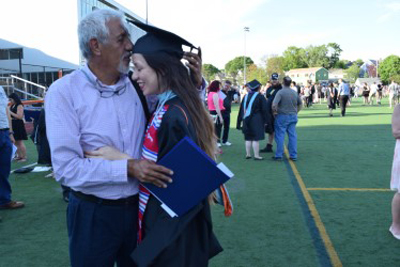
Who has been your greatest inspiration?
My parents are my greatest inspiration and motivation on why I work hard. I come from two immigrant parents from México. My mother is from Guerrero, México and my father is from Ciudad de México, México. My parents didn’t go to college. Growing up in the United States, I always had to translate everything from English to Spanish for my parents. I knew at a very young age that I had to make something out of myself as my parents sacrificed their life to come to this country. As a first-generation Mexican American college student, I had to figure out a lot of things on my own. My grandmother María Echeverría Salgado means the world to me. She always lived in my household and molded me to become a strong, determined woman.
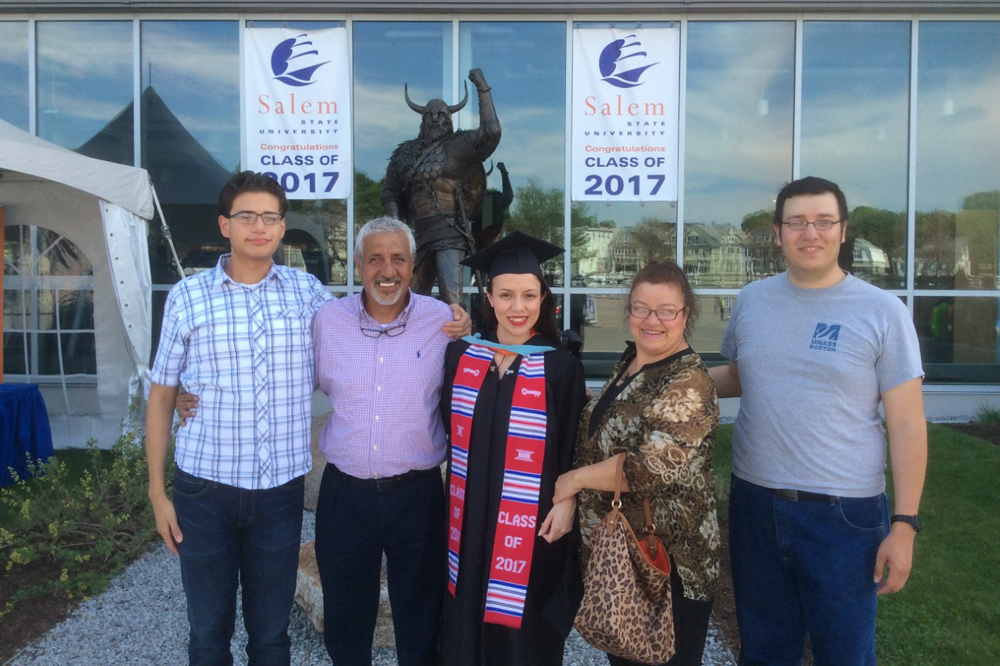
Share with us your proudest accomplishment to date.
I was the first one in my family to graduate from college and the first one to also graduate with a master’s degree. I had to go through many obstacles to make this happen, but it was worth it to see my parents happy. I have opened doors for my two brothers and for many more generations to come.
Tell us what you did in your career or life-wise and tell us about your future.
I studied for three summers at the Escuela de Ballet Folklórico de México de Amalia Hernández in Mexico City, México where I received my diploma of dance pedagogy of Mexican Folkloric Dance. I auditioned and became a professional company dancer for Ballet Folklórico de México de Amalia Hernández in México City. These accomplishments are important to me because this professional dance company is the main group for Mexican Folkloric Dance where I have learned a lot and gained the knowledge to pass on to my students. Many dancers dream of being in this dance company, and I was one of the few who had the privilege in being part of this company. It was a dream of mine for many years. I started dancing at five years of age in a garage dance studio, and to be able to come a long way from years of dance training, meant a lot to me and my family.
I still have a lot of goals set up for myself for the future. I will be graduating with my second master’s degree in summer 2022. I will be finishing up my Master of Fine Arts in Dance Choreography from Wilson College in Chambersburg, PA. I am looking to continue to stay at TAMIU and teach Mexican folkloric dance until I retire. I started my higher education experience with TAMIU as a high school student taking college classes, and I also completed my freshman year of college at TAMIU. TAMIU is home to me. I also look forward to enrolling in a doctoral program in the future to continue to grow as a student affairs professional and empower students at TAMIU.
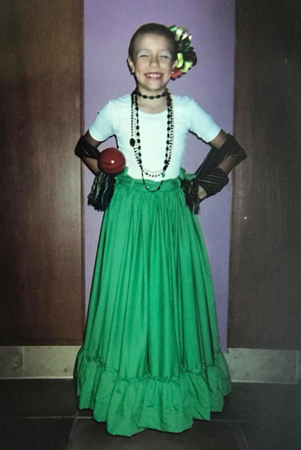
What are some of the aspects of your culture or tradition that you celebrate or appreciate the most and how meaningful are they to you?
There are many celebrations and traditions within the Mexican culture that are meaningful to me. The cultural celebrations that I look forward to every year are El Grito and Día de Los Muertos. These are important to me because with El Grito we celebrate Mexico’s independence from Spain. It gives Mexicans their identity and their pride of being Mexican. On Día de Los Muertos, we remember our loved ones who have passed away. It reminds Mexicans of the importance of familia to the culture. Through these celebrations, we dance Mexican folkloric dance and we embody our ancestors through dance. I also appreciate the music, food, and cultural activities that go into these celebrations.
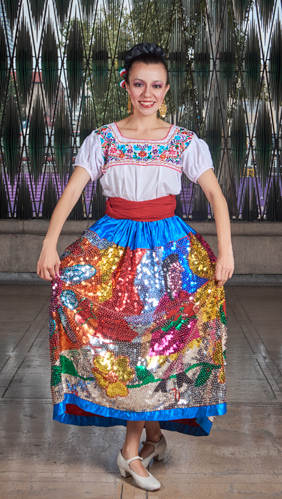
In your opinion, what are some of the notable contributions by people in the culture or traditions that you represent?
There are many notable contributions by the people of the Mexican culture. A person that I look up to is Amalia Hernández. She was a Mexican folkloric dance choreographer and the founder of the Ballet Folklórico de México. She was an ethnographer and traveled to many states in México to learn more about indigenous cultures and traditions. She then blended ballet and modern technique into traditional Mexican folkloric dance to tell narratives of these traditions and cultures, which then created ballet folklórico. Her choreographies are well known, and I look up to her because she gave an identity to Mexican people through dance during a time of uncertainty in the country during the 1950's and 1960's.
Is diversity important at university campuses, in the workplace and overall? Why?
Diversity, equity, and inclusion are an important component at university campuses because we want to provide a sense of belonging for all individuals. It’s important to provide different unique experiences to our students so we can help them become better individuals. I am proud to work for TAMIU, which is a Hispanic serving institution and where my identity is accepted and cherished.